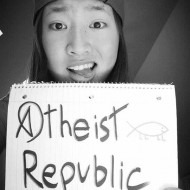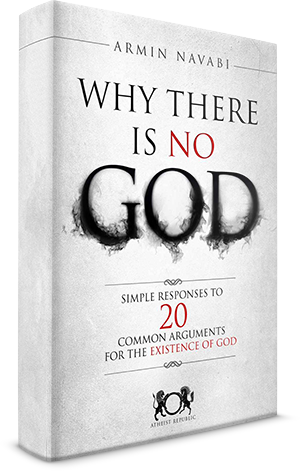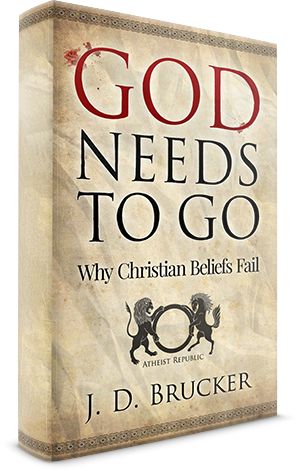Do you believe in fate? I can scientifically prove that it does exist.
Donating = Loving
![]()
Bringing you atheist articles and building active godless communities takes hundreds of hours and resources each month. If you find any joy or stimulation at Atheist Republic, please consider becoming a Supporting Member with a recurring monthly donation of your choosing, between a cup of tea and a good dinner.
Log in or create an account to join the discussions on the Atheist Republic forums.




























The Almighty - "@chimp3 sadly axioms cannot be proven..."
He didn't ask you to prove them, he ask for evidence for them, or basically why do you think they are true (and why should we accept them)?
Logic.. And it perfectly makes sense.. "(and why should we accept them)?"- It doesn't matter.. I asked this to test atheist debating skills and we are not much different from believers.. We are also stereotypes to a large extent and it is really sad..
"We"?
Speak for yourself.
"...atheist debating skills..."
Because how one person debates is proof of how everyone does?
"And it perfectly makes sense."
To whom?
Dear, I am atheist and no different from you.. So why couldn't I use "We"
"Because how one person debates is proof of how everyone does?" "proof"? I am not proving anything sir. I am just observing.. And it seems like the human instinct to attack someone who doesn't belong to their category are prominent in atheism too.. (which I believe is unfortunate)
"And it perfectly makes sense." If not to you, comment why not.
" I am atheist and no different from you.. "
We are decidedly different.
"So why couldn't I use "We" "
Because you have neither requested nor been given permission to represent or speak for me.
"I am not proving anything sir. I am just observing.."
Indeed you are not proving anything and your observations do not equal fact. You made an assertion based on your limited observation and I'm calling bullshit on it.
" And it seems like the human instinct to attack someone who doesn't belong to their category are prominent in atheism too.. (which I believe is unfortunate)"
That's an actual instinct? According to whom? Please site sources.
" "And it perfectly makes sense." If not to you, comment why not."
Hmmm...nope. The point I was making (that appears to have flown by you) is that you seemed to, again, be speaking for more than just yourself.
And, btw, please don't ever call be "dear" again and I am not a "sir".
Reply to your 4th point: It is the core reason of every religious conflicts..
PS: You are debating like a 12 year old boy and it is really sad..
@ The Almighty
"I asked this to test atheist debating skills"
Your own debating leaves (very) much to ask for... You started a thread with a ludicrous title, lied about your intentions, then "debated" while acting like a besserwisser with poor attitude and no sensible responses to critique.
I don't get what you expected to find while acting like that.
And to what end did you want to "test" atheist debating skills?
Psychology says you think better to counter someone's opinion if you consider them as your enemy.
"test debating skills" well i didn't really mean that.. I use that word frequently in my life so it just come up.. I meant to "test atheist personality traits" I concluded that expect some, most of us are like theist who take sides, insults personally, cannot change our belief etc.
"Psychology says you think better to counter someone's opinion if you consider them as your enemy."
Psychology says? Psychology who?
@ The Almighty
I'm a stickler on the terms as usual... I don't think there is such a thing as "atheist personality traits". People have different personality traits, and anyone can be an atheist. Everyone are born as atheists and the state of being a "non-atheist" is taught to children as they grow up (indoctrination), it's even infused in language, traditions, etc.
Perhaps some traits may be a bit more prominent, but the label atheist doesn't by any means remove human nature (basically animal behaviour). You will most likely find just the same rate of a-holes, selfish pricks and antagonists among atheists, as within groups of people with different faiths.
Being atheist, we shouldn't have the traits of theist that makes us choose atheism.
Good point, in that it could be a lack of traits as well.
But my guess is that it's most likely multiple different possibilities of different combinations, as well as external factors.
The point I was trying to make, is that atheists are just as others. People who can take sides, be rude, insensitive and make mistakes. The one of the traits you mentioned that I think *might* be different, is that atheists beliefs might be easier to change, if there were something actual to base those beliefs on.
This guy the "AlMighty" Is just anther self-decided internet genius. He has a theory, he doesn't actually research it or test it, he just decides he will go on the internet an post it and claim he is some great intellect. He doesn't have proof, he doesn't have anything but a big fat ego. He claims that he cleverly fooled everyone here by claiming that he is a theist, then he posted an degrading insulting post against atheist. Well I'm not buying it any more than I am buying his "there is no randomness" bullshit. He can't prove his bullshit and all his action prove him to be a theist. He is trying to prove there is no randomness, therefore there must always be order, thus there must be a higher power, therefore a god. It's a classic faulty logic diatribe. Sometimes they use 1's and 0's, sometimes they just make up shit and try and make it sound scientific, but it's the same old lame bullshit as always. The Almighty is a self agrandized idiot spewing the same crap that we've all witnessed before. there is no use trying to reason with this unreasonable egotistical moron.
@mykcob4.. This is really depressing..
1) I named myself "The Almighty" and said "Why was there this in the first place?"(which was later added), and became slightly arrogant to really look like a theist.. And even after I disclosed the truth you still cannot accept it? How can I convince you that I am a hardcore atheist?
2)If you read your comment neutrally, then you'll realize that you are literally acting like a theist who attacks others who is speaking against their belief calling him satan follower..
3) I am even more depressed by the fact that we, atheists, are also taking sides and cannot take something which is against our "beliefs"..
4) As I have said earlier, I consider bringing personal stuffs into a debate is not the right way to approach a debate..
PS: I never consider myself as a genius.. I am new to internet and I only uses Facebook and YouTube and sometimes wikis.. Also
I don't think that we ,atheists, would feel insulted by any means..
Well there are several things wrong that you yourself pointed out.
1) Your sources are unreliable and are not valid. Wiki, You Tube, and Facebook are not sources from experts but rather are sources that are contaminated with propaganda. They aren't obliged to be truthful and by virtue are not.
2) You proposed an idea (without facts) that there is a god guiding everything. Your basic argument is a pro-theist argument. "everything happens for a reason, therefore there must be something or someone in control." That is theism in a nut shell. They don't understand science. They think everything is organized (predetermined) so they jump to the conclusion that there is a god.
3) If you are an atheist (I highly doubt it) there was NO reason whatsoever to be deceitful about it.
Atheist are no different than any demographic. we will not agree on everything. The nature of atheist are to think critically and independently basing those thoughts on facts.
1) I was trying to prove that I am not an internet genius
2) I didn't say god is guiding everything, I said nothing can be guided.. "everything happens for a reason" Yes.. If you are claiming no, then you are talking against science that something happens for no reason at all..
3) I have already posted reply to that
The Almighty,
You should pay attention to Nyarlathotep who clearly understands a lot more physics than you do. The classical age of Newton's clockwork universe is gone. Scientific conclusions don't deal in certainty, so we won't put that in stone, but experiments appear to have ruled out the idea that "little wheels within bigger wheels" give the appearance of randomness while actually being determined. Randomness appears primal and that seems to be how most physicists see it.
Above and beyond that you don't seem to realize that the laws of nature are idealistic, mathematical descriptions of reality, abstractions that rest on unproven assumptions. For example, no one knows for sure whether space and time are continuous or whether they are ultimately particulate in nature. The laws of nature (our idealized mathematical models) do work amazingly well in some cases and so-so in other cases, but it's pure conjecture to claim that such accuracy could be extended another 50 decimal places! That's why ever more precise experiments are done. They are an attempt to check the mathematical formulas with reality, something that would hardly be necessary if such formulas conferred certainty.
When I started this thread, I was expecting replies like your's and Nyarlathotep's.. And It is really a relief ..
But again you are telling that certainty is limited. And as i have said earlier, it is because of the influence of infinity many other particles.
Also I am not claiming the mathematical accuracy of various laws.. What I am saying is that if there is some uncertainty, it is not because of randomness, but due to other particle's influence on it.
For example: The precision of gravity is limited to some value but the uncertainty value is not random, because uncertainty value is where the influence of other particles starts to account for. (And by gravity value, I didn't mean measured value and by uncertainty I mean only to humans). ie for any instant of time, the gravity is precise to infinite digits.
Assume that we have a parallel universe where everything is synchronised with our universe and have zero influence(which is hypothetical) Then If we could pause one of the universe and then resume, then everything would be like replication of the other one.
You case for infinitely many smaller particles beyond our detection (the ultimate deterministic cause of randomness) is rank speculation, meaning that nothing has been proved. It is a case of "wheels within wheels" which seems to have been ruled out by certain experiments in quantum mechanics. I don't recall any of the details, but I do remember reading an article to that effect. Quantum probability appears to be a condition of our universe although there are some dissenters. (You hardly ever have a situation where everybody agrees on something.)
Determinism also comes with a paradox. Suppose that I had a super-duper computer that could identify every particle in my room and any other factors that would influence the next 20 minutes there. If determinism were true I could, in principle, run that computer and predict whether I would pick up the queen of spades or the ace of clubs. After computing all the relevant factors this computer says I will pick up the queen of spades. The moment of truth arrives. What is it that prevents me from being obstinate and picking up the ace of clubs? It seems that if we can calculate the future in principle, which should be fixed if determinism is true, then I should not be able to change it. Simply knowing the future, based on calculations or whatever, seems to undermine it. If the future is not determined then more than one path must be open and that seems to favor randomness.
This is exactly what I said in my explanation of this thread in the beginning and answer to this argument is within that. If you didn't get it then come back and I'll explain to you where is the fallacy in your super-duper computer theory.
I take it that you are speaking of the infinite regress. I.e., the results of the computation become one more fact that must be factored in which leads to a new conclusion which, in turn, becomes another fact that must be factored in. That means that you can't, even in principle, calculate the future. Now ask yourself, what is the operational difference between an undetermined future and a determined future? Isn't it the ability, in principle, to know what that future is before actually arriving? If there is no way we can ever know, then we might as well as say that the future is indeterminate. Isn't that the essence of an undetermined future, you can't know it until you get there? Isn't the whole justification for a determined universe based on the Newtonian idea of calculating it in principle? To still hold out for a determined future without any means for justifying it is an exercise in metaphysics.
In the magnetic moment experiment Nyarlathotep showed that the same "cause" (particles with the same magnetic moment as determined by the angle) can have two possible outcomes in the detector. In classical physics it's one particular cause, one particular outcome. Notice that we are not talking about a momentum calculation where all the little, unseen bumps from your hypothetical particles might impart a random effect. The particles are started off with a particular magnetic moment and it is only the magnetic moment that plays a role here. Since the same initial condition (the same angle for the magnetic moment of a particle) yields two different results in the same detector, neither path can be deterministic. It appears to be a case of pure chance.
Finally, need I remind you that you have not moved beyond pure speculation with regards to your super-tiny particles. Thus, you have not undermined the chance interpretation of quantum mechanics held by a large number of physicists.
1) Yes.. Future is determined but we could never know.. But doesn't make it undetermined.. Nothing can change what will happen in the future.. So it's a fallacy in your definition of determinism..
2) If the causes are exactly same, then the outcomes should also be same.. And again you are saying it's pure chance that determines the outcome.. But the chance isn't dependent on any physical quantity.. Which is again a fallacy..
How are we defining 'fate?' I've always half thought that the idea of fate as being purposeful or purpose driven was a bit off, and really fate can be just as random as anything else.
"Fate" is a theist word which I used to make atheists believe that I am a believer too... What I am saying is that what is going to happen is certain.. And if it can be random, then 'the change' that makes it random should have been initiated in the present, which makes the future once again certain
I am still chasing you down "Almighty". Your claim is to prove your premise scientifically. That is why I asked for evidence. If you are making a philosophical argument only then please clarify.
I am claiming scientifically with the assumption that even the tiniest particle follows laws. (why I assume that is because every level known to us follows laws and that pattern is expected to continue to the smallest level possible.)
"What I am saying is that what is going to happen is certain.. And if it can be random, then 'the change' that makes it random should have been initiated in the present, which makes the future once again certain".
As I've said before, your assertions are perfectly logical. The problem is that is not what experiment shows. Let me give you the simplest example of randomness I think of.
When you measure the direction of the magnetic moment (kind of like a compass needle) of an electron, you can only get 1 of 2 results, either:
A) the moment is perfectly aligned (0 degrees) with your magnetic field you use to preform the measurement
B) the moment is perfectly anti-aligned (180 degrees, or basically backwards) with your magnetic field.
You can set the moment into any angle you want before the measurement, yet when you measure it you find it "snapping" into only one of two outcomes. This fact alone is already the death knell of classical physics (your idea of a clockwork universe). Here are some interesting results:
1)If you set it at 0 degrees ahead of time, 100% of the time you will get a result of 0 degrees.
2)If you set it at 180 degree ahead of time, 0% of the time you will get a result of 0 degrees.
3)If you set it at 90 degrees ahead of time, 50% of the time you will get a result of 0 degrees.
4)If you set it at 45 degrees, about 85% of the time you will get a result of 0 degrees.
5)If you set it at 170 degrees, about 1% of the you will get a result of 0 degrees.
With a little trigonometry a reader might realize that the above information is just a 'wordy' version of:
(probability you get 0 degree alignment) = [cos(θ/2)]^2.
That trigonometric equation is not sensitive to the large numbers of other particles as you suggested. You can fill the room with lab techs eating double cheeseburgers or put the room in a hard vacuum or any other configuration of nearby particles. It doesn't change anything; you still get only 1 of 2 outcomes, with a distribution completely determined by [cos(θ/2)]^2. This dog of yours (nothing is really random) does not hunt. If the world was classical, there would be a continuous (a hell of a lot more than 2) range of possible outcomes, and it would be sensitive to the arrangement of those other particles you claim it depends on. So classical logic fails here on two levels.
Notice it does not predict the outcome of any given experiment (unless you start at 0 or 180 degrees), it predicts the distribution you will get if you do the experiment thousands of times. There is no way to predict the outcome of any given run.
So we have an interesting situation where we can perfectly predict the distributions of a series of experiments, but can't predict any individual experiment. Set up the experiment with its initial set-up at 90 degrees and you got yourself a true random generator with 50/50 results. Hook that up to some sufficiently violent piece of technology (say a bomb) and you get lab techs and their cheeseburgers getting blown up (or not blown up) for no reason other than [cos(θ/2)]^2.
I patiently await your well thought out response and hope I don't get yet another: "nuh-uh".
So you are telling that my arguments fails due to:
1) The probability of 0 degree alignment can never be predicted even if we know everything about properties of electron and it's fundamental units( if any)
2) The alignment of magnetic moment with field maybe 0 or 180 but there isn't be any reason for that.
Still think so?
"If the world was classical, there would be a continuous (a hell of a lot more than 2) range of possible outcomes, and it would be sensitive to the arrangement of those other particles you claim it depends on. So classical logic fails here on two levels." How would my argument mean that more than 2 outcomes would be possible?
It's apparent that you don't know much about quantum mechanics which is admittedly outside the "common sense" box.
So are you saying that according to that quantum mechanics some 'things' happens for no reason?
Pages